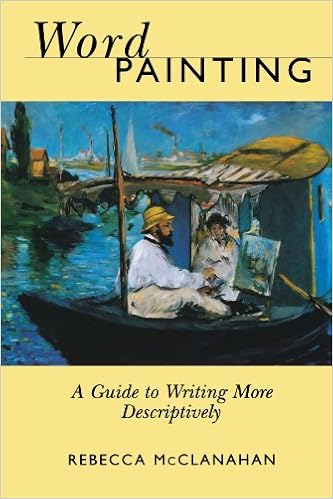 |
| Image from amazon.com |
I've read a lot of writing books. The good ones give you solid advice and pointers, but the great ones open up concepts that you thought you understood and give you a new viewpoint into the subject at hand.
Word Painting is one of the great ones.
Any time you read a writing book, they talk a whole lot about finding your voice, but I think that by voice they mean your own way of doing description. For me, learning about description was a major turning point in my writing. The Elements of Fiction Writing series books Description and Setting helped me understand the basics, to start
thinking about the world differently. Metaphors and similes started to come to
me as I walked to work or waited in line at the grocery store. I started
noticing the little things, the telling details about people, their habits and
quirks. I also stopped walking through the world with blinders on, only focused
on getting where I was going, mind full of work woes or shopping lists. There’s
a lot to see if you just slow down and really look. Ask any three-year-old.
Word Painting covers the basics and a whole
lot more. There’s a chapter on using all the senses, on setting, on character
descriptions, point of view, and plot. I especially liked the chapter on the
big picture, an attempt to pin down that elusive thing called theme and explain
how your description can help bring it forth. Every chapter also has a number
of useful and fun exercises at the end of it.
Here are a few things I
learned:
Good description should be
carefully worded, specific and accurate, but also take into account the musical
quality of language. It should be sensory, concrete rather than abstract, and
in motion when possible. Figurative language is important. Description should
be appropriate for the story you’re writing: flowery prose can ruin a story
that calls for simple clarity.
Language is musical; harsh
consonants give a different feel than liquid vowels. Word choice matters; even if a word is accurate, is it significant,
appropriate, musical? Does it fit the story? Is your language active or
passive, cluttered or direct?
Observation is important.
You have to notice the little things, to be accurate. But you must also use the
eye of imagination to bring your descriptions to life. The eye of memory is
useful, as is insight and the eye of dreams. You mustn’t judge the object of
your gaze, but be accepting. Finding beauty in the grotesque or flaws in perfection can yield effective and unique imagery. Things in motion are
more interesting than something standing still. Try to regain the child’s eye
of looking at the world, that seriousness of play.
Sometimes it’s more
powerful to describe what you don’t see/hear/feel than what you do. (McClanahan
calls this the back-door technique.)
Remove the filtering
devices: you don’t need to use words like “feel,” “see,” “notice,” or "taste." You can just state image directly.
Synesthesia (the
phenomenon in stimulation of a sensory pathway evokes sensation in another) is
good. (You know, something like: The
apple tasted of midnight walks under the harvest moon, of first loves lost, of
autumn’s cinnamon kisses, and the bitter bite of frost.)
I learned a new term:
implied metaphor. It means just what it says: the metaphor is implied rather
than stated outright. For example, you
can say “her eyes are like dark forest pools,” or you can imply it: “you could
drown in the loamy darkness of her eyes.”
Extending your metaphors
is a good idea.
Don’t go totally bonkers
with your metaphors though, there’s original and then there’s just plain
confusing.
You can use your setting
to describe a character, or their inner landscape. (The chapter on describing
characters is gold.)
McClanahan teaches at Queens University and the Rainier Writers workshop, but she also does workshops all over the US, so if you're lucky enough to have a chance to participate in one, go for it. (I'll be right here, waiting for an online course. No, not jealous at all, Okay, I'm lying.)
Here's a link to Amazon if you want to get the book.
No comments:
Post a Comment
Hello, stranger. What's on your mind?